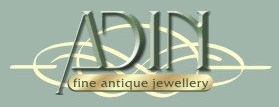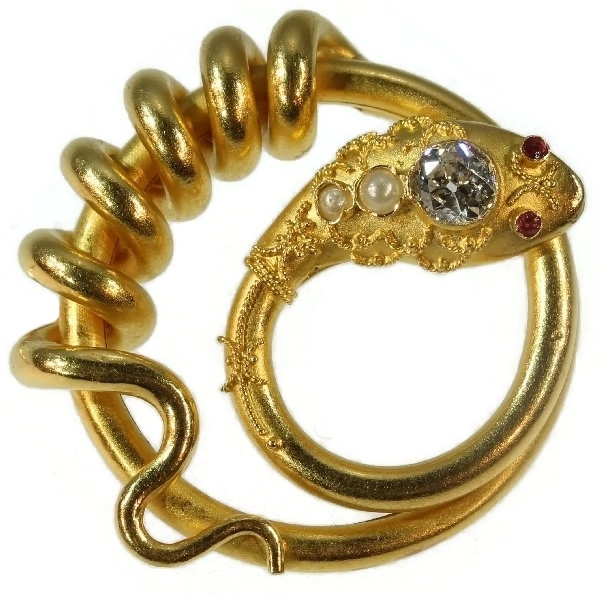We offer layaway, spread payments on the piece of your dreams. Ask us for details. Free insured shipping on all orders !!!
Antique gold snake or serpent brooch with big diamond
Antique jewelry object group: brooch
Condition: excellent condition
- (more info on our condition scale)
Country of origin:
Although it does not carry any legible control marks we believe this to be of Belgian origin.
Style:
Victorian - Victorian decorative arts refers to the style of decorative arts during the Victorian era. The Victorian era is known for its eclectic revival and interpretation of historic styles and the introduction of cross-cultural influences from the
middle east and Asia in furniture, fittings, and Interior decoration. Victorian design is widely viewed as having indulged in a regrettable excess of ornament. The Arts and Crafts movement, the aesthetic movement, Anglo-Japanese style, and Art Nouveau
style have their beginnings in the late Victorian era.
- See also: Victorian
or more info on styles
Period: ca. 1890
- (events and facts in 1890)
Source of inspiration: Mother Nature
Theme:
Snakes and serpents - Serpent is a word of Latin origin (from serpens, serpentis "something that creeps, snake", deriving from the greek word "erpo" and "erpeto", crawl and serpent) that is commonly used in a specifically mythic or religious context,
signifying a snake that is to be regarded not as a mundane natural phenomenon nor as an object of scientific zoology, but as the bearer of some potent symbolic value.
The serpent is one of the oldest and most widespread mythological symbols. Considerable overlap exists in the symbolic values that serpents represent in various cultures. Some such overlap is due to the common historical ancestry of contemporary symbols.
Much of the overlap, however, is traceable to the common biological characteristics of snakes.
In some instances, serpents serve as positive symbols with whom it is possible to identify or to sympathize; in other instances, serpents serve as negative symbols, representing opponents or antagonists of figures or principles with which it is possible
to identify. Serpents also appear as ambivalent figures, neither wholly positive nor wholly negative in valence. An example of a serpent used as a positive symbol is Mucalinda, the king of snakes who shielded the Buddha from the elements as the Buddha
sat in meditation. An example of a serpent used as a negative symbol is the snake who tempted Adam and Eve in the Garden of Eden, as described in the Book of Genesis. (From:
Wikipedia)
Material: 18K yellow gold
- (more info on precious metals)
Diamonds:
One old European cut diamond with an estimated weight of approx. 0.35 crt.
Note: All diamond weights, color grades and clarity are approximate since the stones were not removed from their mounts to preserve the integrity of the setting.
Total diamond weight: approx. 0.35 crt.
Precious stones:
Two red stones for the eyes that could be either rubies or red
paste (also called strass)
And two half seed pearls
- (more info on precious stones)
Birthstones:
Diamond is the birthstone (or month stone) for April,
ruby for July
and pearl for June.
- (more info on birthstones)
Hallmarks: No trace.
- (more info on hallmarks)
Dimensions: diameter 2,90 cm (1,14 inch)
Weight: 4,90 gram (3,15 dwt)
Reference Nº: 15106-0182
Copyright photography: Adin, fine antique jewelry
jewelry with snakes and serpents,
jewelry with animals,
yellow gold jewelry,
jewelry with diamond,
jewelry with ruby,
jewelry with pearls,
jewelry with strass/paste,
latest acquisitions,
antique jewelry,
estate jewelry,
vintage jewelry or
modern jewelry
Jewelry with birthstones (or month stones) for:
January -
February -
March -
April -
May -
June -
July
August -
September -
October -
November or
December.
Additional information:
jewelry glossary -
wall of fame -
visit us in Antwerp -
subscribe to our mailinglist.
What is antique jewelry? -
What is estate jewelry? -
What is vintage jewelry?




